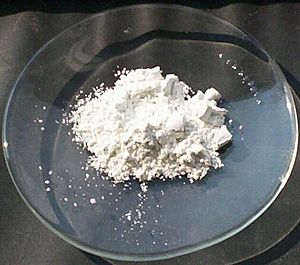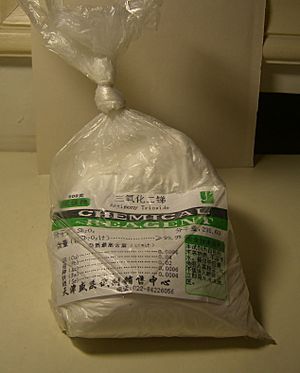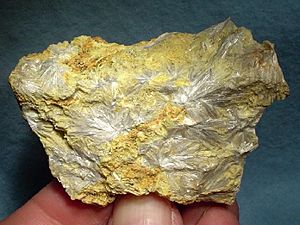Antimony trioxide facts for kids
Antimony trioxide is a special kind of chemical compound. You might also hear it called antimony(III) oxide. Its chemical formula is Sb2O3. This means it's made up of two antimony atoms and three oxygen atoms. Antimony trioxide is a very common compound of the element antimony.
What It's Like
Antimony trioxide is a white, solid material. It's the most common compound that contains antimony. It does not dissolve in water. It can react with other chemicals. For example, it reacts with oxidizing agents to form antimony pentoxide. It also reacts with reducing agents to make pure antimony or a gas called stibine. When it mixes with strong acids, it forms antimony(III) salts. It can also dissolve in strong bases.
Where It's Found
You can find antimony trioxide naturally in two different minerals. These minerals are called valentinite and senarmontite. Valentinite is usually a white mineral, but sometimes it can look pale yellow.
How It's Made
Antimony trioxide is often made when antimony metal is produced. One way to make it is by heating a mineral called stibnite in the air. This process creates antimony trioxide. It can be separated from other substances like arsenic by heating them. Arsenic trioxide boils away before antimony trioxide does.
Another way to make antimony trioxide involves two steps. First, stibnite is burned in the air along with calcium chloride. This creates calcium sulfate and antimony trichloride. Then, the antimony trichloride is mixed with water to finally produce antimony trioxide.
What It's Used For
Antimony trioxide has several important uses:
- Flame Retardant: Its main use is as a flame retardant. This means it helps stop things from catching fire or spreading flames. It's often added to plastics, textiles, and other materials to make them safer.
- Making Glass and Ceramics: It's used to make glass, enamel, and ceramics opaque. This means it makes them solid and not see-through.
- Pigments: Some pigments, which are used to give color, contain antimony trioxide.
- Catalyst: It works as a catalyst for making plastics. A catalyst is something that speeds up a chemical reaction without being used up itself.
- Rubber Production: It's also used as a catalyst for vulcanizing rubber. This process makes rubber more flexible and less likely to crack.
Safety
Antimony trioxide is considered somewhat carcinogenic, which means it might increase the risk of cancer. It can also be a little bit harmful if you eat it or breathe it in. So, it's important to handle it carefully.
See also
 In Spanish: Óxido de antimonio(III) para niños
In Spanish: Óxido de antimonio(III) para niños
 | Claudette Colvin |
 | Myrlie Evers-Williams |
 | Alberta Odell Jones |




